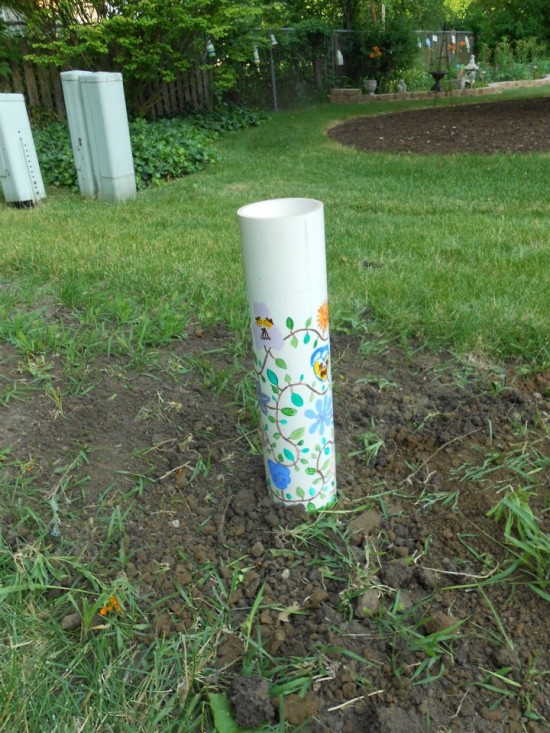
I was sitting out on the deck one day and noticed my neighbor, Erin, bringing food scraps to a long pipe in her backyard. I knew it had to be composting, but I hadn’t seen it done in a tube before. Erin is a college student majoring in Environmental Studies, so I knew she’d have awesome insight into composting. I picked her brain for the infos.
The process is called “Worm Tube Composting,” a kind of vermicomposting.
Here is what Erin had to say:
I wanted to start a compost, but the traditional techniques seemed very involved. I wanted something simple, easy, and effective. I then heard about worm tube composting. It’s so simple: no turning or spreading is needed, and the worms do all the work for you!
Here’s how it works:
A three-foot section of PVC pipe is installed in the garden. Food scraps are put into the tube, and then worm castings (feces) act as the composting agent. The worms crawl into the tube via drilled holes, eat the food, and then spread the compost in a four-foot diameter as they go.
 Get started with apartment composting
Get started with apartment composting
When I was in Seattle for the Offbeat-empire-weekend-of-awesome, I commented to Ariel about how impressed I was at the public compost bins. I'm a big... Read more
But if you’re familiar with composting, you know that not every food item can go into it. No onions, avocados, citrus, or cooked food.
Here are Erin’s tips:
I basically just put in vegetable and fruit scraps. Every time I go out to put in more scraps (every day to every few days), I can see the level of food going down. Also, because worms still function in the winter, this compost works all year round. Although in the winter, the worms will take longer to break down the food.
Here’s the nitty-gritty on actually making this bad boy. You’ll need:
- A PVC tube of either four or six inches in diameter
- Earthworms
- Food scraps
Cut the pipe with a hack saw so that it is between three and three and a half feet long. Drill a bunch of one and ¼ inch diameter holes in the bottom 18 inches of the tube. Sand the edges and feel free to decorate the tube with acrylic paints.
Erin chose an abandoned garden lot in her backyard that she is planning to use as a garden next year. Before you dig, call your local 811 so you don’t accidentally break a line. Then dig a hole for the worm tube.
Dig the hole deep enough so that the bottom 30 inches of the tube are in the ground, and another 12 inches above the holes, which will prevent any mild compost smell from attracting local critters.
Once the tube is in the ground, place a flower pot over the top to keep out the above-ground critters. To get the compost started, Erin bought some red worms at a gas station, and put them in the tube with shredded newspaper and some food scraps.
That’s all it takes! Thanks to my awesome neighbor Erin for lending me her composting expertise. Has anyone else found luck with this method of worm fun?




Well I guess I have to bury the pipe, but how deep it would be?
About 12-18 inches should be good.
We have a very expensive and huge planter that holds almost 100 plants that uses this same system. It has a hollow tube about 6″ wide down the middle to fill with scraps to feed the worms that live in the soil of the planter. Now thanks to the photos I know I can cover it with a pretty pot! I’ve always wanted to use this planter in the house during the winter but never thought of a way to cover the tube, thank you! We live in an area where we have to do Container Gardening for about 75% of our gardening. Will the compost tube work for containers also? For smaller containers (like 2ft. Dia) should I use a smaller PVC pipe? I will definitely use this for our garden next summer, or sooner so I can have good soil ready! Thank you!
Where did you find the cute flower pot for the top?
Quick question, do you have to remove the compost, or will the worms distribute it in the four by four area? I have three raised beds all 8×4. I have had good results in the past they are in an area with great drainage, but after visiting the local zoo here in NC I have seen where they are doing something very similar in their beds.
*********************** NOTICE *******************************
This comment is not intended as “DRAMA”.
I was enjoying the article until I noticed the filthy language in the book ads.
Thank goodness I can just close the page -never to return again – with one click-o-the-mouse.
What is especially strange is your ” No-drama comment policy ” and your “commitment to ‘ civil ‘ , constructive commenting”.
Apparently the filthy langusge on this page is considered by you to be “civil”,
which is certainly open for debate.
No drama taken, Johnny. Colorful language has always been a part of the Offbeat Empire’s publications: https://offbeatempire.com/swearing/